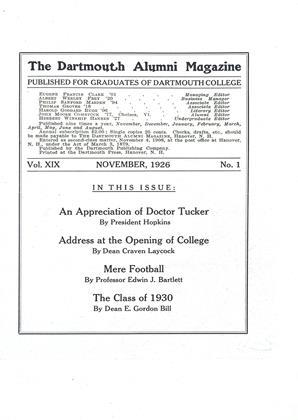The first year of sophomore rushing is over and 369 members of the class of 1929 sport pledge buttons on the campus. More men formed fraternity affiliations than were expected and, with a few exceptions, the twenty-six delegations were quite large.
Last spring hints of illicit pledging stirred Carl Strouse '27, Editor of The Dartmouth, to threaten exposure of any house detected. Numerous rumors floated around during the opening weeks of college, but nothing definite was done by the Interfraternity Council which seemed to realize that much of the fault lay with its own stupid rules which segregated the class of 1929 last year.
Strouse stated in his editorial column of the college daily: "On Friday night four sophomores admitted that they had been approached by a representative of the fraternity in question previous to the nights set aside for chinning, and had shaken hands that they would join as requested.... Needless to say, if the guilt was proven, all parties concerned would meet with disaster. In order to avert this impending disaster, a representative from the Interfraternity Council, The Dartmouth, and the fraternity concerned met in conjunction with a level-headed man of the faculty to consider the best action to take....the best interests of the College were always the ultimate aim. Here are the results.
"First, it was decided not to publish the name of the fraternity. .. .there seemed to be a lack of justice in such an action, in asmuch as it was recognized that practically every fraternity on the campus was breaking rules, only to a less marked degree. Second, it was thought that the four sophomores who had broken the rules had done so not realizing the significance of their acts. These four men were requested to consider all obligations which they had made in the past null and void. The Dartmouth, believing that justice had been given to all, decided not to issue the special Saturday afternoon edition. If The Dartmouth through its determined efforts to focus the spotlight of justice on fraternity relations, has succeeded in silencing future attempts to bring back unenforcible rushing rules, our work has not been in vain."
With fraternity contact permitted for the class of 1930, the benefits of sophomore pledging should be fully realized this year.
Outstanding in developments pertaining to fraternity organization took the form of an announcement that Epsilon Kappa Phi, a local fraternity founded in 1920, had been granted a character in Delta Upsilon, a national organization started at Williams in 1834, having at present fifty chapters in this country and Canada. The formal installation will be held some weekend after the close of the present football season.
The officers of the Non-Fraternity club which came into being last spring announced recently that they have leased from the College a house on North Main street on the site of the new library as headquarters this winter. This building will provide a social center for non-fraternity men. Funds for furnishings are being solicited from nonfraternity alumni.
 View Full Issue
View Full Issue
More From This Issue
-
 Sports
SportsMERE FOOTBALL
November 1926 By Professor Edwin J. Bartlett '72 -
 Lettter from the Editor
Lettter from the EditorEditorial Comment
November 1926 -
 Class Notes
Class NotesCLASS OF 1921
November 1926 By Herrick Brown -
 Class Notes
Class NotesCLASS OF 1911
November 1926 By Prof. Nathaniel G. -
 Article
ArticleTHE CLASS OF 1930
November 1926 By E. Gordon Bill -
 Class Notes
Class NotesCLASS OF 1917
November 1926 By Ralph Sanborn
Article
-
 Article
ArticleGENERAL STREETER'S WORK IN THE AMERICANIZATION MOVEMENT
February 1919 -
 Article
Article"HECTIC BUT STIMULATING"
August 1924 -
 Article
ArticleDartmouth Night
July 1956 -
 Article
ArticleDCAC "Football News"
MAY 1957 -
 Article
ArticleLoving the Dartmouth Life: A View from a '90
OCTOBER • 1987 -
 Article
ArticleFlying
JUNE 1977 By BRAD W. BRINEGAR '77


